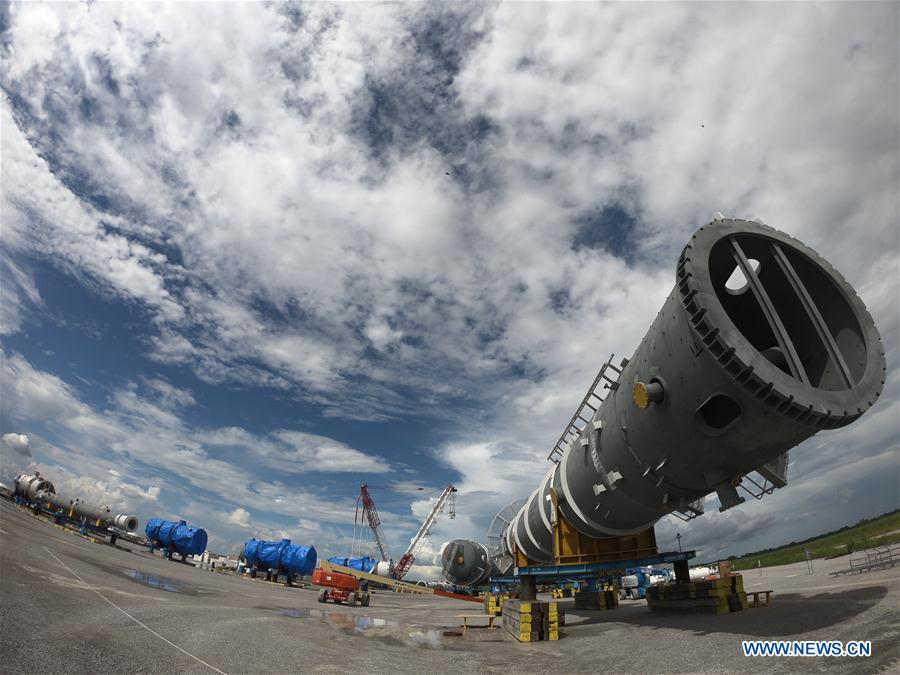Yuhuang Chemical's US methanol project on track
By Liu Yinmeng in New Orleans, Louisiana | China Daily | Updated: 2018-09-05 11:18

Charlie Yao, CEO and president of Yuhuang Chemical Industries Inc, a wholly owned subsidiary of Shandong Yuhuang Chemical Co Ltd, wanted to build a $1.85 billion methanol production facility on 1,200 acres of farmland in St. James Parish, Louisiana.
A little over a week ago, he moved one step closer.
YCI announced on Aug 23 that it has entered into a business agreement with Wichita, Kansas-based Koch Methanol Investment, a company that distributes chemicals. As part of the deal, Koch has acquired an indirect minority equity interest in YCI Methanol One Llc.
The deal also gives Koch affiliates methanol off-take rights from the Yuhuang facility, as well as the right to construct, own and operate the methanol terminal assets for the outbound flow via ship, rail and truck.
"Koch Methanol's decision to invest in YCI Methanol sends a clear signal to the industry about the strength of this facility," said Yao.
"The new facility is located in a region with convenient access to natural gas, a highly skilled workforce, and world-class transportation infrastructure, allowing us to be very competitive in our production and distribution," Yao said. "If viable, there is also sufficient land to add a second and third plant."
Located in a strategic location near the Mississippi River, YCI is the biggest greenfield investment in methanol by a Chinese company in Louisiana.
Yao said he chose the Louisiana location because the state government offered better incentives and the site has easy access to railroads and waterways.
The company's corporate office in Houston, Texas employs about 60 people, and the St. James Parish complex employs about 30 people, Yao said. Almost all of the workers are local hires.
According to Yao, the idea for YCI was hatched in 2009 when Wang Jinshu, chairman of Yuhuang Chemical, decided to take his business outside China.
"He chose the US because it has a big market for methanol, and it also has lower costs for natural gas, a feedstock for methanol," Yao said.
Methanol is a chemical used in the manufacturing of numerous everyday consumer products, such as paints, plastics, furniture and carpeting. It is produced from synthetic gas, which can be made from biomass, agricultural and timber waste, or solid municipal waste.
According to Marketsand-Markets, which provides industry research, the global methanol market is expected to reach $54.16 billion by 2021. The global production of methanol is 40 million metric tons per year.
A 2017 report from IHS Markit shows that Northeast Asia, which accounts for 54 percent of global methanol capacity, is the world's leading consumer of methanol, followed by North America, Western Europe, the Middle East and Southeast Asia.
YCI announced the St. James project in 2014, and Yao, a former general manager at Shell with more than 10 years of industrial technical and manufacturing experience under his belt, officially took the reins the same year.
Yao said YCI gave him a platform for building a startup company. In addition, he was impressed by Wang's determination and vision.
The project also caught the eye of Bank of China, which arranged a syndicated loan of $800 million for the firm.
"The management group of Yuhuang is determined, responsible and professional," said Xu Chen, president and CEO of Bank of China USA and the chairman of the China General Chamber of Commerce-USA.
Based on sharp judgment and years of experience in the industry, Yao decided to purchase steel from the US market when the Trump administration took over. That decision prevented the company from being affected by tariffs later placed on imported steel.
Xu said the investment environment for overseas Chinese companies is important, but it is also essential for the companies to be professional and confident about their own operations in order to succeed.
Yao said commercial production of methanol for YCI is expected to begin in mid-2020.
About 60 to 70 percent of its products are sold to customers in the US, while 20 to 30 percent go to China and 10 percent to Europe.
The plant is projected to create 100 permanent jobs, while construction of the facilities will result in 1,000 construction jobs.
























